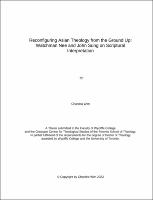| dc.description.abstract | “Asian theology”, as a separate category within contemporary theological studies, has proven problematic on several fronts. Among the category’s most significant challenges has been its failure to engage fairly and substantively grassroots Asian Christianity. This failure has perhaps been due, first, to the category’s own conceptual captivity to the Western Enlightenment; and second, to its practitioners’ common unwillingness to take seriously the lived experiences of the ordinary people of God in Asia as a source of theological reflection. This is most clearly seen in “Asian theology’s” engagement—or rather disengagement—with Scripture: contemporary construals of Asian theology tend either to devalue Scriptural authority (for contextual/cultural relevancy) or dismiss the traditional figural reading of Scripture. This dissertation proposes that the theological hermeneutics of Watchman Nee and John Sung provide a rich and complementary set of resources for understanding a grassroots approach to Scripture that is both authentically Asian and faithfully Christian. While Nee and Sung were highly influential leader-preachers in China and Southeast Asia, their names almost never appear in handbooks of Asian theology and biblical interpretation. And while there are some serious recent studies on Nee and Sung’s work, scholarly evaluations of their theology and interpretation of Scripture are scarce, suggesting that either Scripture is not central to their overall theology or there is nothing particularly distinctive in their exegesis worth analyzing. This dissertation aims to address this scholarly lacuna by focusing on Nee and Sung’s interpretive practices, unearthing their cultural, hermeneutical, and theological assumptions, and then detailing their influence on and legacy among contemporary grassroots Christians in China and Indonesia. Ultimately, I suggest that their theology and interpretation of Scripture have had more influence on grassroots Chinese Asian Christians—perhaps even on the majority of Asian Christians—and have greater resonance and relevance for them, than does the work of many contemporary Asian theologians, especially those well-known in the West. | en_US |

